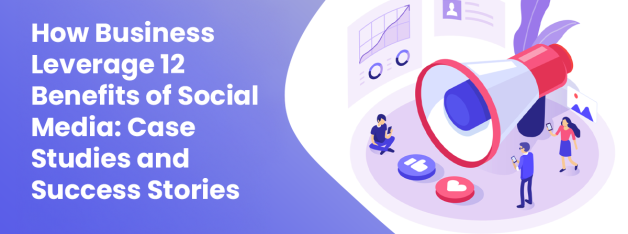How Business Leverage 12 Benefits of Social Media: Case Studies and Success Stories

Thanks to this new age of the digital world, social media continues to be an indispensable resource for any business that desires to reach the target market, expand social media presence, or gain measurable outcome. From awareness about the brand to increases in website traffic or customer trust to the potential consumers, the rewards go on nearly without end.
This blog discusses 12 important benefits of social media marketing, case studies, and success stories that focus on how companies used these tools to achieve sales increases and long-term growth.
1. Brand Awareness
A strong presence in social media enables a company to reach millions of users and turn the company into an identifiable brand.
Case Study:
A skincare startup was using carousel ads for running an Instagram campaign with benefits of products. Post the campaign, it saw its followers grow 300% and the number of inquiries regarding the product increased by 50%.
Takeaway: Inconsistent posting and good content can garner maximum visibility to your brand within the target audience.
2. Generating Website Traffic
This would take any potential leads to the website, which in turn builds even more engagement that would eventually lead to more conversions.
Case Study:
A travel agency posted its attractive itineraries on Pinterest. It linked every post to specific landing pages, and in a period of three months increased website traffic by 60%.
Pro Tip: Use the CTA button “Shop Now” or “Learn More” to direct the user easily to your website.
3. Trust-Building Authentic Engagement
The primary cause for effective marketing is trust. Social media enables brands to humanize through direct engagement with their target audience.
Case Study:
Weekly live sessions by B2B software companies on LinkedIn were targeted customer pain points. The openness and transparency will build the credibility of the audience, and 25% of the audience would become a paying customer.
Takeaway: Legitimate engagement and transparently builds trust creates long-term loyalty and relationship.
4. Right Targeting Audience
With social media, targeting capabilities become much advanced through the right platforms, and that will reach the right kind of customer.
Success Story:
Facebook Ads ran as a fitness brand targeting people looking for a healthy life. It resulted in 40% membership based on targeting by region, age range, and type of interest for the campaign.
Pro Tip: Use platform-specific targeting tools such as Instagram Insights or LinkedIn Audience Analytics.
5. More Sales, Though
The complete sales lift will happen directly on the sales account through just making the product highly visible, where there are offers being served and ad targeting again potential buyers.
Case Study
Influencers wear their imagination with the various usages of an e-commerce brand product and use it in diverse ways. As such, there were viral advertisements during the TikTok campaign for an e-commerce brand, whose sales increased by 200%.
Lesson learned: Urgency and authenticity in sales can be achieved through the help of influencers or even user-generated content.
6. Community and Brand Advocacy Encouragement
Social media gives space to the users as they make the user feel that he is part of the social network.
Success Story: A coffee house on Facebook developed a discussion community about brewing techniques. Repeat rates among its customers shot up by 30%.
Pro Tip: Keep the engagement flowing within your community through comments on comments; let the community spark the conversation.
7. Low Cost Advertisement
Compared to other advertisement types, it is more affordable through social media by promoting your goods and services to customers.
Case Study
Organic posts and Stories in Instagram helped launch this start-up to create 5,000 leads within a month while using no money for paid advertisement.
Takeaway: Even a startup with limited budget can yield effective results with the right strategy.
8. Customer Support Improvement
Real-time support through social media and direct problem-solving of queries can be provided by businesses.
Success Story
A telecom company came up with a handle on Twitter to clarify all the grievances by customers. Response times were improved by 50% and customer satisfaction ratings increased.
Pro Tip: Implement social listening tools to track the number of mentions of a brand and address queries.
9. Deep efforts into Advanced SEO
Although social media has nothing to do directly with SEO rankings, it does help to drive the highest volume of traffic and boost visibility of your brand.
Case Study:
A restaurant posted blog links on Facebook and Instagram, driving large volumes of visitors to its website. Increased visits had an upward push in the local Google search results.
Takeaway: Publishing excellent and engaging content will have indirect impacts on SEO performance.
10. To show their successes and tell testimonies to business – the best platform remains social media.
Social media is the perfect platform for businesses to highlight their achievements and share testimonials.
Example:
A consulting firm shared client success stories on LinkedIn through short posts and videos, leading to a 20% increase in inquiries.
Pro Tip: Use a mix of visuals and text to make your marketing case study posts more engaging.
11. Enhancing Brand Storytelling
Social media provides a platform to share your brand’s journey, values, and mission, creating emotional connections with your audience.
Case Study:
A fashion brand used Instagram Reels to share behind-the-scenes footage of its sustainable production process. The campaign attracted eco-conscious buyers and led to a 30% rise in sales.
12. User-Generated Content
The potency of user-generated content can raise the quotient of trustworthiness and involvement manyfold.
Example:
An example of this strategy is that one home decor company began an open running hashtag challenge by which its clients are to share pictures of the renovated space and can get more followers along the way. As a result of the UGC campaign, they gained 25 percent more on Instagram.
Tip: Give prizes or discounts when getting the best and the most UGC participation.
FAQs About Leveraging Social Media
Q: What’s the best platform for brand awareness through social media?
A: Visual content would be best suited to Instagram and TikTok, while LinkedIn would best suit B2B audiences.
Q: What are the ways one might measure the success of their business on social media?
A: Practical application can be measured in engagement rates, website traffic, and lead conversion.
Q: What is the least expensive means to establish a great social media presence?
The most practical approaches are organic development through constant posts, interesting content, and participation with micro-influencers.
Conclusion
Social media has offered business enterprises opportunities that no other form of communication can offer in reaching the target audience, gaining their trust, and pushing sales up. It’s about learning from the success stories of such businesses, which also includes knowing their strategies, including UGC, influencer collaborations, and targeted ads.
Whether you’re a startup or an established brand, the key to success lies in understanding your audience and leveraging the right tools to engage them effectively. Ready to take your social media strategy to the next level? Start experimenting today.
